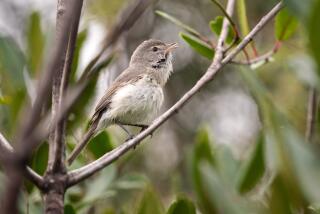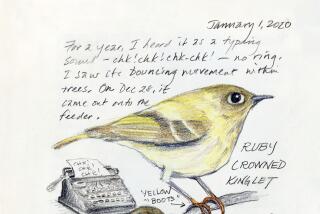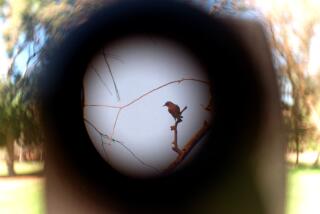With a Little Seed Money, He Builds Feathered Following
Pigeons, doves and sparrows arrive by the hundreds each afternoon about 3 and create a shrill commotion. They circle a hilltop home next to the San Gabriel River Freeway in Whittier, ready to swoop down for a feast the home’s owner will lay out.
Wally Rudell, thickset and 75, scans the bird-thickened sky as he holds a bag of grain.
“Go ahead and feed them, dad,” his wife, Doris, says.
“C’mon, babies,” he calls. “C’mon, babies. C’mon babies.”
The birds crowd onto the Rudells’ dirt lot just beyond a wire fence that separates it from their yard.
Beyond this lot looms a hazy valley that holds Pico Rivera.
“It’s just a hobby,” the man says with a shrug, though he spends $65 a week on the grain. “I feel sorry for animals.”
So close to Uptown Whittier, and across the street from a large residential neighborhood, this is an unexpected rural setting. It could be Minnesota, where Rudell grew up on a farm.
The Rudells’ house, where they have lived for 46 years, was moved about 100 yards to its present Beverly Boulevard site in 1962 because it was in the way when the freeway was being built.
In front of the low, wood-frame home is a bread crust-littered yard. A tall Chinese elm tree with a leaning trunk reigns over the yard, which contains old furniture and an old-fashioned mower that gets pushed across the scruffy grass.
There is a doghouse, too, though it is too small for Rudell’s two golden retrievers.
And there is a birdbath, whose centerpiece, a porcelain penguin, is missing its head. Rudell fills the birdbath four times a day.
As Rudell spreads the feed on the dirt, the gliding birds circle and circle, their shadows speeding across the yard like the dizzying shadows that the rotating lights at discos used to cast.
But many of the chattering birds are content to wait to descend from power lines and telephone wires.
“We get pigeons,” Rudell says, a toothpick in his mouth, “then we get a bunch of doves. They come in, and then the sparrows and once in a while a crow comes down and gets a little bread. It’s been going on the last 10 years.
“They set up in the wires here, you know. They see I’m movin’ around. They know it’s me.”
Green- and purple-necked pigeons greedily peck up the grain. “I like them,” Rudell says. “They’re just beautiful looking.”
The birds eat warily, for danger lurks on Pioneer Boulevard, which borders the lot. Startled by a motorcycle, a truck horn or boom box, they lift off in a cloud of dust, flapping furiously, as if from a scene from Alfred Hitchcock’s “The Birds,” except these birds don’t attack.
For 45 years Rudell made a good living as a machinist while also manufacturing a device that drills holes in bowling balls. Now in retirement, he sits with his wife on bent chairs in the shade of their carport and watches the birds eat.
He says he has had only one complaint from a neighbor about the birds. Only one, he supposes, “because they don’t roost.”
At 5 p.m. the birds leave, and solitude returns to the hilltop.
“When they get full, they take off,” Rudell says. “I don’t know where they go. To the ocean maybe. But I’ve never seen a sea gull here.”
Asked how long he will keep this up, the bird man of Whittier says, “As long as I can afford it. You know, they gotta eat.”
More to Read
Sign up for Essential California
The most important California stories and recommendations in your inbox every morning.
You may occasionally receive promotional content from the Los Angeles Times.










